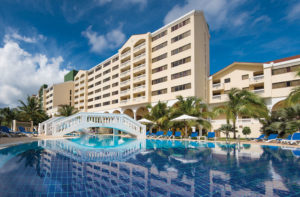HAVANA, CUBA—Starwood Hotels & Resorts recently opened Four Points by Sheraton Havana—the company’s first hotel in Cuba. It also makes them the first U.S.-based hospitality chain to enter Cuba in nearly 60 years.

Four Points by Sheraton Havana has established the first U.S. hotel presence in Cuba since diplomatic relations were restored.
“It is the first United States hotel in Havana since 1959,” said Jorge Giannattasio, SVP and chief of Latin America operations, Starwood. “It is quite a historic landmark for Starwood and the hotel industry.”
The opening follows the deals signed by Starwood in Cuba earlier this year. These include the Havana icon Hotel Inglaterra, which will join The Luxury Collection. The company also signed a Letter of Intent to convert the famed Hotel Santa Isabel into a member of The Luxury Collection. Four Points Havana is a conversion of Hotel Quinta Avenida.
“I think that Starwood was the first, but not by pure luck or coincidence,” said Giannattasio. “We were the first because we know how to enter into new markets. It’s part of our corporate DNA. We have a tenured Latin American team and that helps with overcoming some barriers in new markets. We not only understand how to speak the language but also how to do business in Latin America.”
Four Points Havana is owned by Grupo Hotelero Gaviota and managed by Starwood Hotels & Resorts. The 186-room hotel strives to cater to international travelers with an emphasis on approachable design and stylish comfort, according to the hotel company.
The new Four Points is located in Havana’s Miramar district—a business and financial center that houses many international embassies. “Modern business hotels with conference facilities and multiple restaurants and bars would do great here,” said Eddie Lubbers, CEO of Cuba Travel Network, an online distribution channel. “With a seafront location, hotels here could offer the ideal combination of mixing business with pleasure.”
Home to the Miramar Trade Center, Miramar currently has a dozen hotels in the area, according to Collin Laverty, president of Cuba Education Travel, which organizes educational exchange programs and people-to-people travel to Cuba for U.S. citizens and residents. Many of the hotels were built in the mid-1990s and feature large conference rooms and resort-like swimming pools that overlook the ocean.
“About 20 minutes from the Old City, this will continue to be the business district and is most in need of new and/or refurbished hotels that can offer adequate accommodations to business travelers,” said Laverty.
In addition to Miramar, Havana currently has two other districts in need of updated lodging products. Old Havana, a UNESCO world heritage site, mainly features independent hotels. “As there are a number of restrictions on signage and modifying facades, high-end, boutique products are most appropriate, and are in need for this area,” said Laverty.
Vedado, surrounded by ministries, businesses and tourist destinations, offers a mix of small and large accommodations. “Hotels here double for tourist and business travelers alike, ranging from colonial mansions converted into small hotels to the larger Art Deco hotels that were run by the mob in the 1950s to a few that were built or restored over the last two decades,” Laverty said.
While Starwood reviewed a number of properties and destinations in Cuba overall, the global chain sought to focus on the city of Havana based on the status of local regulations for U.S. companies conducting business in Cuba and the limited resources available.
The company’s strategy for targeting luxury properties in Havana falls in line with a forecast from Arturo Garcia Rosa, president and founder of SAHIC, the South American Hotel & Tourism Investment Conference. “Existing properties will be updated; in fact, some of them are now under this process and others are waiting for the right partner,” said Garcia Rosa. “U.S. brands will follow the Starwood way.”
The most significant challenge to developing or converting hotels remains Cuban regulations. “The approval process for new foreign investment projects continues to take years, requiring approval at the highest level, oftentimes from the President himself,” said Cuba Education Travel’s Laverty. “Many companies have been negotiating for years, in some cases, decades, and are still waiting for the final signature.”
According to Laverty, the Cuban government strongly prefers management contracts as opposed to joint ventures, which leads to shortages of capital investment and problems with construction. “Many of the buildings they are shopping around as potential management contract agreements need significant repairs, staff overhauls and other major changes, and the proposed model doesn’t give the foreign partner the necessary power to make those improvements,” he added.
As new hotels enter Havana, Airbnb continues to have an impact on leisure travel. However, the online rental accommodation giant is not perceived as a major disruptor to lodging demand in the city, noted Giannattasio. “What’s different about the Four Points Havana is the high level of standards for U.S. lodging,” he said. “Guests will have the opportunity to experience the brand’s high-caliber amenities, safety standards and guest services from our well-trained associates.”
Four Points Havana offers 1,000 sq. ft. of meeting facilities, full-service dining at Don Quixote, breakfast and lunch service at El Olivo and poolside light bites. The hotel features the brand’s signature Best Brews offering local beers Cristal and Bucanero at the hotel’s lobby bar. It also offers WiFi throughout the hotel. Amenities include a 24-hour fitness center, a business facility and a fully equipped spa, offering a variety of massage treatments as well as a sauna and steambath. Prospective hotel properties in Havana would benefit from offering amenities such as rooftop pools and cigar lounges, suggested Cuba Travel Networks’ Lubbers.
As a result of an undersupply of lodging in Havana for a number of years, Airbnb sought to accommodate leisure travelers, according to Laverty. “Because hotels are so overbooked, and the fact that many cannot guarantee good plumbing, reliable customer service and strong air conditioning, many travelers have turned to Airbnb, where they pay half the price and can see recent reviews by other customers,” he said. “Many of the newly repaired colonial mansions and high-rise apartments being offered on Airbnb can provide a better experience than many of the Havana hotels for half the price.”
With more cruise lines approved for voyages to Cuba in recent months, the lodging industry in Cuba will help increase occupancies in Havana. Lubbers stated, “The cruise passengers are likely to be returning visitors to Cuba and when they do, they will likely stay in a hotel. So I actually think the cruise industry is serving the lodging industry very well.”
As Havana undergoes a transformation, industry insiders predict increased travel and tourism, which bodes well for the lodging industry. “Cuba receives 3.9 million tourists a year,” said Giannattasio. “I think with more incoming flights from the U.S., especially those approved from major cities directly to Cuba, the number of visitors will drastically increase. It is a great opportunity for Starwood to enter the market.” HB


